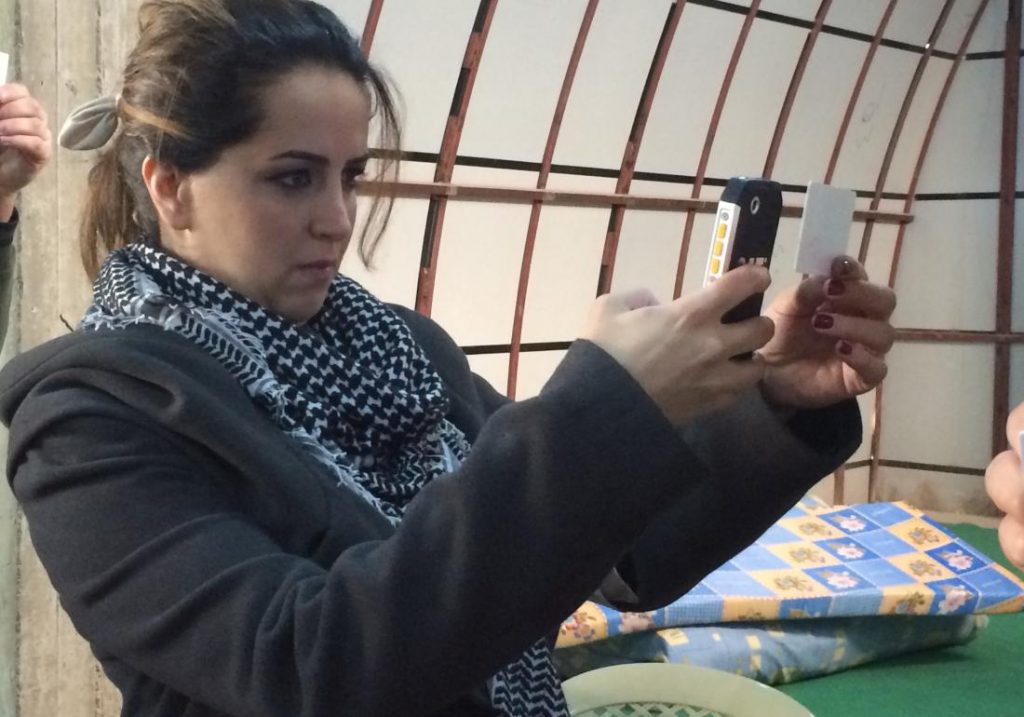
Use of Mobile Technology Reduces the Time to Register Displaced People in Iraq
UNICEF field supervisor, Namrud Zargon, was excited as he assisted the internally-displaced people (IDPs) waiting for their registration to be completed at Sharia Camp in Duhok, the Kurdistan Region of Iraq. After the verification was completed, the people received their cards which grant them access to the distributions and IDP activities.

“Having this one online database of IDPs’ data accessible anytime for humanitarian workers is a welcome change in our work,” said Zargon. “Imagine, we can now check beneficiary data anytime and anywhere when it is needed,” he adds.
The more organizations who use the technology, the greater pool of shared information will be available.
Zargon added that the digital technology will make their IDP records more organized and will help to speed up a lot of relief processes. UNICEF has partnered with World Vision on this mass registration project aimed digitally registering all the occupants of the IDP camps in Iraq, hundreds of thousands of people. The Sharia Camp activity is just a start.
The Last Mile Mobile Solutions (LMMS) is a mobile technology developed and designed to make the delivery of humanitarian aid quicker and easier while still complying with reporting and accountability requirements. The hand-held device even works even in remote areas to register people affected by crises.
With the device, aid workers can gather basic information about each person and issue registration cards, which are then used to improve the speed and efficiency of aid distributions. The data gathered can also be analyzed quickly and used to plan additional assistance as well as monitor and report on the assistance provided.
LMMS Specialist Kamran Said shared that the process of registering over 3,000 families in the Sharia Camp went smoothly with only 25 per cent of the families needing further validation due to loss of documents or duplication of the Public Distribution Cards (PDS). These concerns are very minimal.
Among those in line and left proudly holding her new registration cards was Halima Bakarat, 36, a mother of 10 children who became the head of the family when her husband left and never came back. Mother Amsia, 30, was the last to come, together with her 2-month-old baby, Bewar. After roughly 10 minutes of waiting, she went home smiling with her IDP card.
LMMS Manager, Dede Monfiston, lauds the partnership between World Vision and UNICEF, noting how it should bring more efficiency in future relief activities in the camps at the Kurdistan Region. In the Sharia Camp, 3,171 households were registered in one afternoon. Without the technology, by contrast, the registration of this many families would have taken days or weeks depending on which documents the IDPs have available.
To date, World Vision is working with UNICEF and World Food Programme (WFP) to implement the use of this technology. The organization is working to expand its network, with the goal of making LMMS available for all aid agencies working in Iraq.
To date, the registration campaign has reached 25,675 households covering at least 154,050 people for World Vision’s Food Vouchers Program funded by WFP and for UNICEF’s beneficiaries in Sharia Camp.
Note: The LMMS Program is supported by the Government of Canada through the Department of Foreign Affairs, Trade and Development (DFATD).
originally posted on wvi.org